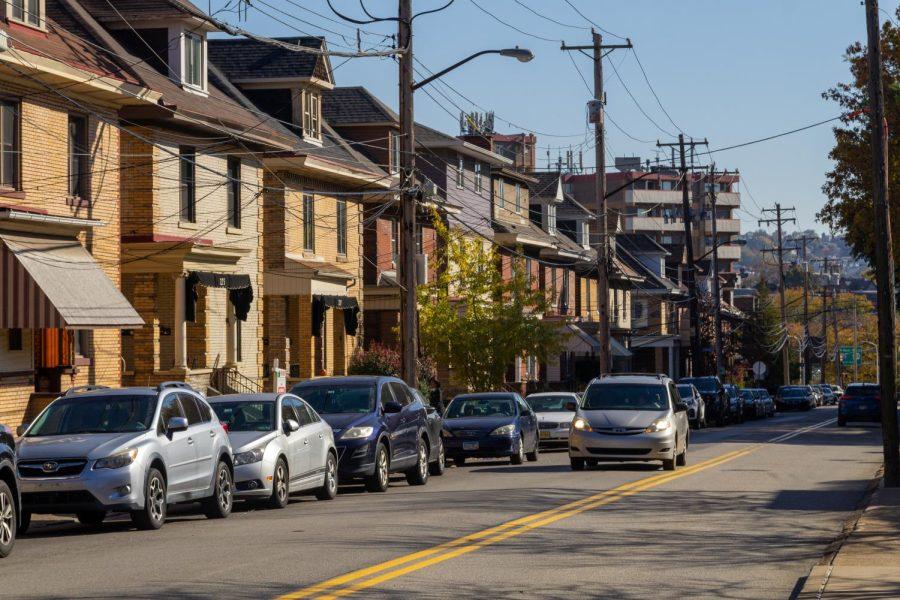OBID meeting brings community leaders together to address equitable accessibility
John Blair | Senior Staff Photographer
Halket Street in Oakland.
March 2, 2022
For John Tague, a 72-year-old power wheelchair user, equitable accessibility means something different to each member of the disabled community.
“I try to view equity as across disability not just about someone with a physical disability, but someone with multiple disabilities,” Tague, treasurer of the City-County Task Force on Disabilities, said.
Tague spoke Monday afternoon at a meeting hosted by the Oakland Business Improvement District to discuss accessibility and inclusion in Oakland. Seven community organizations and developers addressed topics such as expanding Oakland’s non-student community and the impact that new developments could have on efforts to increase accessibility.
Tague said he hopes to see an increase in the number of Oakland businesses with automatic door openers.
“It’s another way of making a welcoming [environment] because it gives people with physical disabilities an opportunity to enter on their own,” Tague said.
One plan that would impact neighborhood accessibility is Walnut Capital’s Oakland Crossings plan. Walnut Capital plans on rezoning 17 acres of South and Central Oakland, creating more green space, a grocery store, an elevated pedestrian crossing bridge across the Boulevard of the Allies and “walk-to-work” housing. The plan has sparked controversy among some residents, while others look forward to the project.
Todd Reidbord, president and founding partner of Walnut Capital, said the company is taking accessibility into account, and is enthusiastic about applying new design elements — such as automatic doors and count-downs on crosswalks — to help make Oakland Crossings more accessible.
“As a private developer, we realize how important it is for the disability community to feel as welcome as anyone and equal to everybody in Oakland,” Reidbord said.
Reidbord also said Walnut Capital is focused on accessibility in terms of creating more affordable living.
“I think the beauty of developing in Oakland is really that you can create an affordable living scenario for a variety of people, whether they’re people that work at the University, whether they’re people that have just graduated recently or new to Pittsburgh and want to have place to live that are close to where they work,” Reidbord said. “We think that creates this whole atmosphere of affordable living.”
Another planned advancement for affordable living is Pitt’s Walk to Work Incentive Program. Paul Supowitz, the University’s vice chancellor for government relations, said the program has two major goals — attract and retain employees at Pitt, and drive more non-student residents to move into the Oakland neighborhood.
He said the community has expressed a great deal of interest in achieving these goals, and that they are necessary steps to attract the kind of amenities to the neighborhood that the community wants, such as a grocery store.
“You need to have a density of year-round residents in order to support businesses, to support things like a grocery store that is a business with low margins and large volume,” Supowitz said.
The planned Walk to Work Program will provide renters and homeowners access to a variety of housing types, according to Supowitz. He said the incentive would be tiered to provide greater support for employees at the lower end of the University compensation spectrum who often have the farthest to commute, which he said “really underscores” how important this program is. He said it would still be offered to all employees, though.
Jim Pieffer, president and CEO of Presbyterian SeniorCare Network, and David Ennis, president of Affirmative Investments, are partnering up to build a senior living complex at the corner of Forbes and Craft avenues. The proposed complex, according to Pieffer, will consist entirely of accessible or adaptable units and will address the issue of affordable housing affecting the senior community by providing housing for those seniors at or below specific median incomes.
Pieffer added that even though they won’t reserve residential units for LGBTQ+ seniors, they will extensively market to this “historically overlooked” group.
While there are many plans to increase accessibility in the area, Matt Berwick, UPMC’s program manager for disability accommodations and clinical services , said he’s excited about UPMC’s partnership with Oakland for All, a community organization working to make Oakland a more accessible and welcoming neighborhood through events such as the Oakland Ramp Crawl.
“One of the things that really gets me excited about it is that it’s really bringing the opportunities for the business owners to be aware of the opportunities of the people that work and live within Oakland that have disabilities and really making sure that it is an inclusive environment for everybody,” Berwick said.
Another current initiative to highlight small businesses is Argyle Studios, a retail space at 3608 Forbes Ave., which provides a space for artists and vendors to sell their merchandise. Argyle Studios, which is the result of a partnership between OBID, InnovatePGH, city and county stakeholders and UPMC, is run by a mother-daughter team, Brigette and Christine Bethea.
Brigette Bethea, Argyle’s CEO, said she hopes Argyle Studios can provide an opportunity for residents to shop local and to allow Pittsburgh artists and vendors to rebound from the difficult retail landscape of the past few years.
“[Argyle Studios] gives folks the opportunity to buy local. Additionally opportunities for our entrepreneurs and makers to be able to sell during and after the height of the pandemic,” Bethea said.



